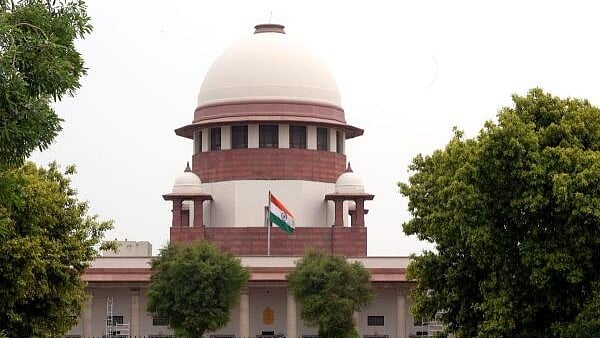
A view of the Supreme Court
Credit: PTI File Photo
New Delhi: The Supreme Court on Tuesday said the power of judicial review forms part of the basic structure and courts cannot decline an answer to constitutional questions even if the controversy was political in nature.
The top court, however, said it would only interpret the Constitution while dealing with the Presidential reference on whether the court could impose timelines for governors and President to deal with bills passed by state assemblies.
On the sixth day of the hearing on the presidential reference, a five-judge Constitution bench headed by Chief Justice B R Gavai was informed by Tamil Nadu's counsel and senior advocate Abhishek Singhvi, who said the Centre had argued that actions of Governor and President were immune to judicial review.
The Centre argued any judicial intervention would destabilise the constitutional balance and it would be antithetical to the concept of separation of powers, he added.
Referring to the Minerva Mills (landmark ruling that reinforces basic structure doctrine) verdict, the bench said, “It emphases that judicial review is part of the basic structure… the controversy may be political in character but so long it raises a constitutional question, the court can't decline to answer it." The bench, also comprising Justices Surya Kant, Vikram Nath, P S Narasimha and A S Chandurkar, asked, “The question is whether a general timeline (for governors and President) can be given under Article 142 of the Constitution." Article 142 of the Constitution grants the top court the extraordinary power to pass any order necessary to achieve complete justice in any case before it, even if it involves overriding or filling gaps in existing laws.
Solicitor General Tushar Mehta, appearing for the Centre, objected to Singhvi’s reliance on state-specific examples, including Andhra Pradesh.
“If they are going to rely on such cases, we will have to file a reply. Since Independence, the Constitution has been taken on a joyride in some states. If we travel down that dirty path, we will have to place the full record before this court,” he added.
The CJI steered the debate back to constitutional issues and said, "We are not going into individual instances whether it's Andhra Pradesh or Telangana or Karnataka but we will only interpret the provisions of the Constitution. Nothing else." Singhvi then summarised what "falling through" of bills means.
Singhvi said, a bill "falls through", in one instance when the state assembly, which has been asked by Governor to reconsider it after it is returned in exercise of powers under Article 200 of the Constitution, "may not want to send it back, may not want to pass it, may change its policy." The CJI asked Singhvi what would happen if Governor decides to withhold the bill and does not send it back to the assembly.
Singhvi said, "If that happens, then all this sending back to the assembly does not happen. Earlier verdicts said, the bill falls through unless the first proviso in Article 200 is followed (which requires the bill to be sent back to the assembly)." Emphasising the dangers of inordinate delays by governors in granting assent or referring bills, he outlined the need for a Constitutional “timeline” framework.
“Case-to-case interventions will not solve the problem,” Singhvi argued, stressing Articles 200 and 201 themselves “necessitate a general timeline".
He said without structured limits, governors could effectively exercise a “pocket veto”, stalling legislation indefinitely.
Singhvi said limiting remedies to individual writ petitions under Articles 226 or 32 would render the problem systemic and “a delay of three to five years defeats the legislative process itself".
He said the constitutional design favoured workable timelines and the court would be “defeating the whole exercise if relief is limited to individual disputes." Senior advocate Kapil Sibal, appearing for West Bengal, said, “Withholding assent thwarts the will of the people.” “For the first time in history, this court would be asked to hold that the will of the people needs not be implemented because Governor withholds assent, an unacceptable proposition,” he added.
Neither governors nor President had any independent legislative power, Sibal said.
“Where in the Constitution is there a provision that allows the Governor to thwart the legislature?” he asked.
Sibal said treating withholding of assent as a discretionary power of Governor would amount to a “breakdown of constitutional machinery” that violates the collaborative spirit of governance.
“No principle of constitutional law allows one organ to become an impediment to another. Discretion is a concept alien to Article 200. What the Governor performs is a constitutional duty, not a free-willed choice,” Sibal said.
Even if some discretion exists, he added, it must be exercised within constitutional contours and not as an “absolute power".
The hearing would resume on Wednesday.
In May, President Droupadi Murmu exercised powers under Article 143(1) to know from the top court whether judicial orders could impose timelines for the exercise of discretion by the President while dealing with bills passed by state assemblies.